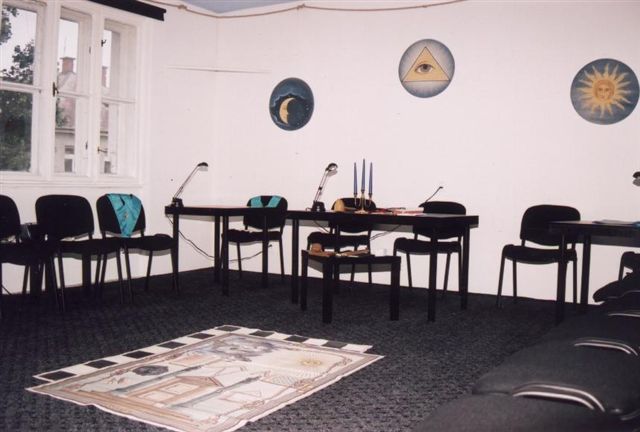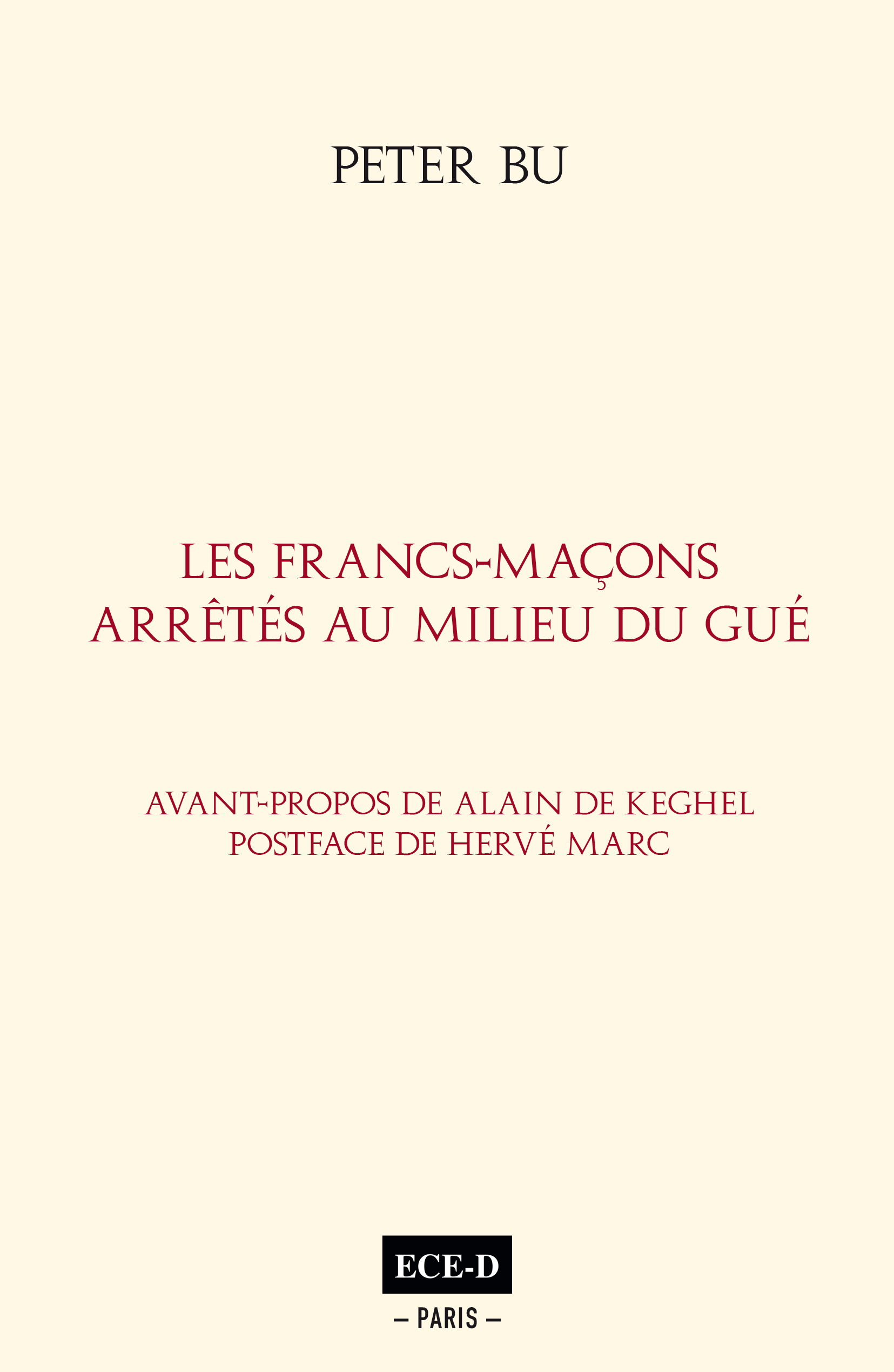E. Origin of The Call of Bratislava to reunite all Freemasons
 1. History: three phases
1. History: three phases
In 2007 and 2008, the Grand Lodges and the Czech and Slovak Grand Orients carried on lengthy discussions about the nature of their organisations. They created a study group that compared their rites and were very surprised to find they had no fundamental differences. In reviewing their respective practices and those of some of its members, it seemed likely that their obediences mutually recognised each other as authentic Masonic organisations. These young obediences, newly created after the fall of the Berlin Wall (1989), following half a century of inactivity imposed by the enemies of Freemasonry, were too weak and could not achieve their goals. Most of them agreed to merge into a Masonic organisation under the auspices of the United Grand Lodge of England.
I participated in these debates and, little by little, made the first version of my Confederation proposal. Initially it only covered Central Europe. It was widely debated by my Slovak and Czech Brothers. I rewrote it, made revisions, translated it into French, then enriched it with the contributions of some 30 French, Swiss and English Brothers and Sisters. This sequence of thoughts led to the second draft, once again discussed, and then a third and a fourth, which is now open to wider debate.
2. How did you come up with the name The Call of Bratislava?
Here is an excerpt from a novel, which was quite unexpected, that explains:
I would have liked to be alone. Alas, Peter entered the Festive Board and sat down between Gilbert and me. He is a Parisian from the Grand Orient and a native of Slovakia. He is one of those Masons living in utopia; the kind Theo calls "our particle accelerators." The more foolish their dreams, the more their passion gives them wings and energy. Peter wants us to sign a solemn appeal to universalism that is embodied in a European Masonic organisation that would include all obediences in Europe, even the coyotes. Gilbert refused. On principle. Since the initiative for this project comes from a member of the Grand Orient of France, it is bound to fail, he said.
As for me, I'll sign, even if a petition is not the way lodges operate. I suggested it be named "The Call of Bratislava" since it comes from elsewhere – certainly not from the Grand Orient of France – because everything we’ve proposed in the last thirty years has failed. I agree with Gilbert on this point. He immediately made fun of me, making his feelings known straight away. That I become the strong one in a little lodge in Provence, yes, congratulations, he agreed, but if I step into the big business of inter-obedience affairs, certainly not.
Everyone has his place. They are not within my reach. He did not say why. It was annoying and even humiliating for Peter and me. No action should come from us. We should go and negotiate in London, where they told us that we don’t exist.
Peter wasn’t bothered either. He wants – and he will get – 20,000 signatures, he reassured us. Including those of our Sisters, of course. With mine anyway. And if we happen to go the way of the English, we will go.
Then Louis Jamet entered the banquet room and Gilbert seemed surprised. From his point of view, I’m not on the same level as Louis Jamet, the university professor. So what were we going to do together? Peter left immediately, trying to be discreet. Gilbert settled in.
Excerpt of a "Masonic crime novel" The Luberon Case by Jean Verdun, former Grand Master of the Grand Lodge of France, published by Luc Pire, Belgium, or see http://www.jeanverdun.com/luberon.htm, Episode 12, page 209.
This passage came as a shock to me. The idea for the petition came from Jean Verdun, and in speaking with him, I certainly never claimed to have obtained 20,000 signatures, any more than Jean promised to sign it. But I'm glad he decided to mention the project in his book and am pleased with the good impression that I made on him during our first, and thus far only, meeting.
If the great Freemason Jean Verdun endorses my proposal for a World Confederation of Masonic Obediences,
If this idea has received an equally favourable opinion of some other well-known sources
The United Grand Lodge of England (UGLE)
The "mainstream" Swiss obedience ALPINA,
The Grand Lodge of France (GLF)
The Grand Orient of France (GODF)
The Grand Women’s Lodge of France (GWLF)
The Czech Grand Lodge (CGL)
And dozens of other Brothers and Sisters,
Then a glimmer of hope shines on this project.
3. Biography of the author :
 a) Secular resume
a) Secular resume
Born 26/05/1940 in Bratislava, Slovakia, married, two children.
Studied at Theatre University, History and Theory Department, Bratislava, Czechoslovakia (1957-62).
PhD thesis on Stanislavsky’s theories of art of actor , The Slovak Academy of Sciences, Bratislava (1963-68) then 3rd Cycle Studies on Politics and Culture in the USSR at The Sorbonne Institute of Slavic Studies, (1968-72).
Literary Adviser and Tour Coordinator for many theatre companies in France and abroad (1972-81, 1986-2008), Projects and Research for the Pompidou Centre, Paris (1979-80), the French Ministry of Culture (1980-81), Slovak Republic Ministry of Foreign Affairs (1999-03) etc., Theatre Programme Manager at the Rennes Maison of Culture, (1982-84), Cultural Exchange Project with Slovakia as part of Marseille’s application to be European Cultural Capital of 2013 (2007-08). Marseille won the competition and shares this title with the Slovak city Kosice.
Artistic Director of numerous theatre festivals, and mime in particular, as well as street theatre performances in France and abroad (1976-2006), Gaukler in Cologne (1976), Mimes and Clowns at the “In” Festival in Avignon (1977), Mimes and Clowns, De Blauwe Zaal, Utrecht (1977), Paris - Barcelona - Modena (1982), Outside/Inside at Tours (1983-1986), Mimos in Perigueux (1987-2002), Paris – Forum Festival (1989), Ideklic at Moirans in Montagne (1990-1994), Mimica No Acarte, Lisbon (1990), Bratislava - Brno - Prague (1991), Teatro Europeo, Torino (2003-2006).
Theatre Critic in Czechoslovakia and France (1960-82), Editor of the journal Gestures dedicated to physical theatre (1992-2002).
Writer of the Play All This Nonsense About Women ("Toutes ces âneries sur les femmes", www.aneries-sur-les-femmes.fr), in collaboration with Benoit Vitse, (2010-11).
b) Masonic resume
Initiated 17/05/1991 at the lodge La Bonne Foi in the Orient of Saint Germain en Laye, GODF, Companion 20/03/1992, Master 30/04/1993. In autumn 1995, admitted to the 4th Degree of the Ancient and Accepted Scottish Rite in the Europe lodge in the Orient of Prague, then in the 14th and 18th Degree atThe Enneade, the Orient of Saint Germain en Laye, same rite. In 1999, appointed Venerable Master of Honour by Humanizmus lodge in the Orient of Bratislava. Published writings in Masonic journals of the Grand Orient of France (GODF) Slobodomurár (Freemason, Grand Lodge of Slovakia) and elsewhere. Confederation Project, 2007-2011.
Lighting the fire of Freemasonry in Slovakia:
In 1992, Jacques Orefice, GODF Deputy Grand Master for External Affairs, invited me to help our Brothers in Prague in their efforts to restart Freemasonry in Czechoslovakia, which was on the point of being divided into two states. I quickly found myself alone with the task of rebuilding the movement in Slovakia.
It was not easy to rekindle the flame of Freemasonry after half a century of slander and prohibition, first by a World War II fascist regime, then another Stalin-like totalitarian regime and with the Catholic Church continually throwing their 2 cents in to the mix. Any remaining trace of Freemasonry had been erased. However, Freemasonry had existed on this land for nearly two centuries.
To rebuild, I took the following steps :
- Gradually lowered the level of mistrust among authorities and the public by organising press conferences, giving interviews to radio, TV and newspapers,
- Lead public debates,
- Built personal relationships and carried on correspondence with some 200 laymen who expressed interest,
- Translated the rites
- Designed and having a stage designer friend build the very beautiful tools necessary to equip a Temple,
- Secured a Masonic library for the lodge in French, English, German, Italian, Russian and Hungarian (the texts in Slovak and Czech could not be found),
- Searched for publishers willing to produce books on Masonry, the first being the great classic Masonic Symbolism by Jules Boucher, published in 1998 in Czech, and Freemasons, Builders of Light by Daniel Beresniak, printed in 2002 in Slovak,
- Organised and conducted, under the auspices of the GODF and in the company of French, Belgian, Austrian and Czech delegations, the lighting of the fires at the Respectable Lodge Humanizmus (Humanism) on 8/05/1993, followed by the initiation of the first four Slovak Brothers the next day,
- Found sites for our regular meetings,
- Directed the lodge for three years,
- Continue to help the lodge operate,
- Built a website and hosted it until spring 2008,
- Provided for exchanges between Humanizmus and lodges in France, Austria and Hungary.
In 2009, the Humanizmus lodge left the GODF to contribute to the creation of the Grand Lodge of Slovakia, under the auspices of the UGLE. (A detailed history was published in The Chain of Union, GODF, Paris, No. 18-19.)
My workload in Slovakia largely explains why I have held only one elective office in my mother lodge, La Bonne Foi in Saint Germain en Laye, the position of Grand Expert from 1999 to 2001. In 2008, I was elected to the National Commission of Reflection on Sustainable Development.
c) Reflections:
- What is the purpose of a Masonic lodge?
=> Read and take part - The word, art and symbolic thought
=> Read and take part - The initiation of women and Co-Masonry
=> Read and take part - Initiatory character of position platforms on societal issues
=> Read and take part






